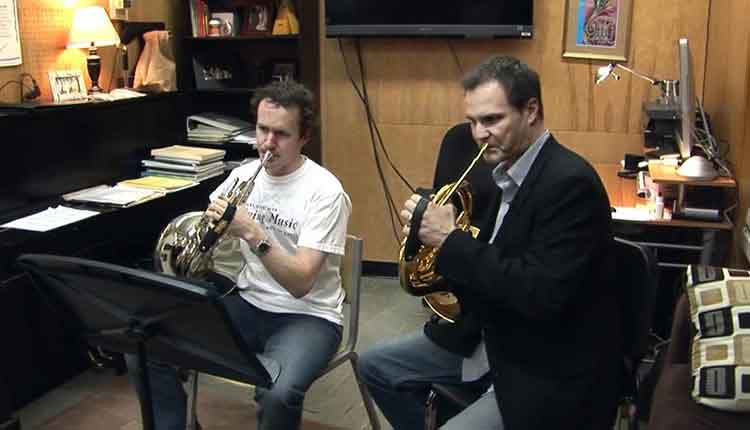During the early 1990s, M. Dee Stewart, professor of trombone and euphonium at Indiana University, noticed a sudden increase in the number of lessons he was teaching to prospective students. These high school students were all looking for the same thing – a surefire way to get into music school. Like most professors, Stewart took his obligation to share his audition knowledge and advice very seriously, but quickly realized that an hour lesson “wasn’t nearly enough time to prepare students for a career in music”. One summer, he organized and taught a week-long course on college auditions, university life, and class requirements to 10 trombone players. The administration at Indiana University liked the idea so much, Stewart invited the other brass faculty to participate the following summer, and the College Audition Preparation program was founded. Inclusion of the woodwind faculty soon followed, and the course has been available to percussionists for the past two years as well.
After nearly a decade, attendance has risen from 20 student participants to 60, and Stewart suspects the number may continue to grow. The program is open to high school students of all ages who are seriously considering a career in music, and the average age of participants has gone from mainly seniors to sophomores and juniors, as well as an occasional freshman. There is no screening process, no required audition tape; part of the purpose of this program, claims Stewart, is Ato show students where they stand. “For example, many incoming freshmen are unaware of the theory and piano proficiency courses required in their degree program, and struggle to make up these deficiencies. CAP students meet with theory professors, who give them an idea of what to expect in a typical freshman-theory course, and their piano skills are discussed. Those who discover they have trouble in these areas may opt to take piano lessons or brush up on their theory knowledge before they enter college. By the end of the week, each student will know what their strengths are and what they need to work on in the coming months if they want to be accepted into a music program at any American university.
“The faculty is not here to teach only basic skills” he continues, “we focus on preparing students for that college audition because it is such a pivotal turning point; those 10 minutes could potentially determine a career path for the rest of their lives.”
Aside from nerves, one of the biggest problems professors regularly encounter in auditions is inappropriate literature selection. “We’re trained to listen through the nerves” says Stewart. AI just wish more students realized that they don’t need to play the piece that sounds the hardest, they should play the piece that sounds the best. We’re not looking to be impressed; we want to hear their potential and would prefer a good tone, musicianship, and control over a bunch of notes any day.” The faculty helps each student select materials to play for upcoming auditions, hand-picking pieces that make them sound good but also demonstrate their musicality, range, and other qualities that audition committees want to hear.
Although the main focus is on performance, the program covers topics such as university life, applying for financial aid, and course requirements but leaves time for recreational activities as well. Parents are encouraged to participate in the orientation on the first day, which includes all students, faculty, and counselors, then stay for the concert given by IU students that evening. Sunday is devoted to fun activities, such as a campus tour and group band session, and culminates with a faculty concert in the evening. This concert is Stewart’s favorite part of the program. AIt is really rare to hear so many world-class musicians play solos on different instruments in the same concert. The variety is amazing.”
The real work begins on Monday with private lessons in the morning. Each student receives 15-20 minutes of individual instruction daily, but faculty members often schedule three students for an hour and take turns teaching one while the other two observe. Students often have similar problems, and can learn by watching others work through their difficulties. The rest of the day is devoted to classes in theory, jazz, and history as well as making resumes and practicing for the next day’s lesson, with a concert, ice cream social, or movie outing in the evenings. This schedule continues through Thursday and leads up to mock auditions on Friday. Each faculty member spends the week walking their studio through every aspect of an audition, and coaches them on everything from deep breathing and mental preparation to calm nerves and prevent rushing through the music to making small talk with the audition panel, which is another area where many students falter.
Parents and students are invited to observe the mock auditions; having others in the room often helps to give performers audition-day jitters while the onlookers learn by observation. Each student has 10 minutes to walk into the room, engage in small talk with the faculty member (who acts as if they have never seen the student before), and play while the professor takes notes. After everyone has auditioned, the faculty members meet individually with each student and their parents to go over the audition notes and suggest ways to improve performance in future auditions.
Students come from all over the United States, as well as Canada and Puerto Rico, to attend the week-long session. Alumni of the CAP program, who the faculty fondly refer to as “Cappers”, keep in touch with the professors long after they leave the program, sharing news of their successful auditions in college and beyond. In fact, feedback from these participants has been overwhelmingly positive. Stewart is quick to point out that CAP Ais not a recruiting tool for Indiana University,” and although a colleague recently counted 13 Cappers performing in a university orchestra concert, these numbers merely emphasize the effectiveness and importance of prospective students making contacts with university professors long before audition day.
Once Cappers get into a music program, Stewart hopes they will remember the importance of being organized and scheduling practice time, and to know what to do and where to be at all times. He also hopes that the glimpse they received into the many specialized areas within the music field will prompt Cappers to explore a number of activities their freshman year. “The first years of an undergraduate degree are the formative years,” says Stewart. “Students should try a variety of things, and once they see how to best use their talent, they can narrow their focus as an upperclassman and in graduate school. The field of music is very broad; while it is important to first become a good musician, the career options are endless.”
Professor of Music, Indiana University. M. Dee Stewart was a member of the Philadelphia Orchestra for 18 years. He previously taught at the Curtis Institute of Music. He has given master classes worldwide, including the annual College Audition Preparation Workshop at Indiana University. Mr. Stewart has given recitals on alto, tenor, and bass trombones, euphonium, and bass trumpet.
For More information on the College Audition Preparation Workshop at Indiana University Click Here
For More information on M. Dee Stewart Click Here


